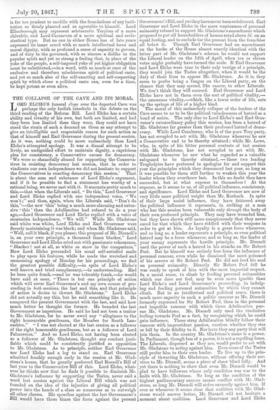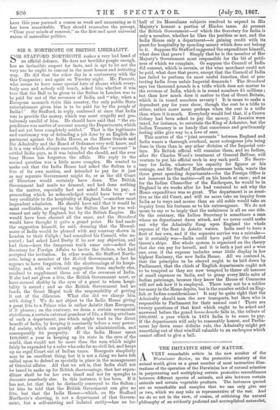11:111 COLLAPSE OF THE CAVE AND ITS MORAL. L ORD ELCHO'S
funeral iloge over the departed Cave was perhaps the only foolish interlude in the debate on the third reading of the Reform Bill. Lord Elcho has a certain ability and vivacity of his own, but both are limited, and had they been less limited than they were, they could not have stood the strain of such a demand on them as any attempt to give an intelligible and respectable reason for such action as that of himself and Earl Grosvenor during the present session. As it was, nothing could be more melancholy than Lord Elcho's attempted apology. It was a dismal attempt to be lively, an undignified effort to maintain dignity, a capricious plea for consistency, a Conservative excuse for democracy. We were so shamefully abused for supporting the Conserva- tives in resisting democracy last session, that in order to vindicate our own independence we did not hesitate to support the Conservatives in enacting democracy this session.' That is about the sum and substance of Lord Elcho's argument, and if it be possible to find a statement less worthy of a rational being, we never met with it. It amounts pretty much to this,—that when the Liberals said, "Do this," Lord Grosvenor and Lord Elcho replied with one independent voice, "We won't ;" and then, again, when the Liberals said, "Don't do this,"—the new 'this' being a much more alarming and exten- sive 'this' than the Adullamites had refused to do a year ago,—Lord Grosvenor and Lord Elcho replied with a voice of stentorian independence, "We will." While Mr. Gladstone said white was white, Lord Elcho and Earl Grosvenor were fiercely maintaining it was black; and when Mr. Gladstone said, "Well, call it black, if you please; this proposal of Mr. Disraeli's is, on your own principle, a thousand times blacker," Lord Grosvenor and Lord Elcho cried out with passionate vehemence, " Blacker ! not at all, as white as snow in the comparison." How Lord Elcho persuaded his usual self-satisfied smile to play upon his features, while he made the wretched and unmeaning apology of Monday for his proceedings, we find the greatest possible difficulty,—in spite of Lord Elcho's well known and tried complacency,—in understanding. Had he been quite frank,—and he was tolerably-frank,—he would have said at once, "There is but one principle of action which will cover Earl Grosvenor's and my own course of pro- ceeding in both sessions, the last and this, and that principle of action is desire to thwart Mr. Gladstone." Lord Elcho did not actually say this, but he said something like it. He compared the present Government with the last, and said how much better he thought the former. He branded the last Government as imperious. He said he had not been a traitor to Mr. Gladstone, for he never owed any "allegiance to the right honourable gentleman, the Member for South Lan- cashire." "I was not elected at the last session as a follower of the right honourable gentleman, but as a follower of Lord Palmerston." And so Lord Elcho, not having been elected as a follower of Mr. Gladstone, thought any conduct justi- fiable which could be consistently justified as opposition to Mr. Gladstone. As to principle, neither Earl Grosvenor nor Lord Elcho had a leg to stand on. Earl Grosvenor admitted frankly enough early in the session at Mr. Glad- stone's house, that he greatly preferred Earl Russell's Bill of last year to the Conservative Bill of this. Lord Elcho, what- ever he thinks now that he finds it possible to diminish Mr. Gladstone's influence by supporting the Tories, never said a word last session against the Liberal Bill which was not founded on the idea of the injustice of giving all political power into the hands of a class so numerous as to outweigh all other classes. His speeches against the last Government's Bill would have three times the force against the present Government's Bill, and yet they have never been redelivered. Earl Grosvenor and Lord Elcho in the mere wantonness of personal animosity refused to support Mr. Gladstone's amendment which proposed to put all householders of houses rated above M. on an equal footing, and to exclude for the present from the franchise all below it. Though Earl Grosvenor had an amendment on the books of the House almost exactly identical with the latter part of Mr. Gladstone's scheme, he would not support the Liberal leader on the 12th of April, when ten or eleven votes might probably have turned the scale. If Earl Grosvenor and Lord Elcho were true to their only vestige of a principle, they would join the Tories altogether, when it would be the duty of their lives to oppose Mr. Gladstone. As it is, they seem to prefer being a fungus on the Liberal party, on the chance that they may spread, like cancer, to other Liberals. We don't think they will succeed. Earl Grosvenor and Lord Elcho have not in them even the sort of political vitality,— the cancerous vitality,—which, like a lower order of life, eats up the springs of life of a higher kind. The moral of this melancholy collapse of the leaders of the Cave seems to us to be the political valuelessness of hatred as a bond of union. The only clue to Lord Elcho's and Earl Gros- venor's extraordinary policy this session, has been a hatred of Mr. Gladstone far greater than their professed hatred of demo- cracy. While Lord Cranbome, who is of the pure Tory party, has not scrupled to act with Mr. Gladstone whenever he saw a Conservative end to be thereby attained ; while Mr. Lowe, who, in spite of his bitter personal contests of last session with Mr. Gladstone, has not scrupled to act with Mr. Gladstone whenever he saw what he regarded as a valuable safeguard to be thereby obtained, — these two leading Troglodytes have preferred to apologize for and support this year the principles which they denounced last year, so long as it was possible for them still further to weaken this year the leader whom they overthrew last. In this no doubt they have succeeded, but at what expense to themselves f At the expense, as it seems to us, of all political influence, consistency, and significance. Lord Elcho and Lord Grosvenor are now of very little more political weight than Mr. Roebuck. In spite of their large social influence, they have frittered away the political influence it represents, in striking at a man who has this session been vulnerable only through the body of their own professed principle. They may have wounded him, but they have shown still more conspicuously that they never cared for that which they have riddled with their weapons in order to get at him. As loyalty is a great force whenever, and so long as, a leader represents a principle, so even political hatred may be a force whenever, and so long as, the leader of your enemy represents the hostile principle. Mr. Disraeli used the power of such a hatred in his attacks on Sir Robert Peel. But he himself was entirely free from the influence of personal rancour, even while he dismissed the most poisoned of his arrows at Sir Robert Peel. He did not feed his soul on personal animosity. Directly Sir Robert Peel fell he was ready to speak of him with the most impartial respect. In a moral sense, to climb by feeding personal animosities which one does not feel, may be even more ignoble than Lord Elcho's and Lord Grosvenor's proceeding, in indulg- ing and feeding personal animosities by which they cannot climb. But in an intellectual and political sense, there is much more sagacity in such a politic rancour as Mr. Disraeli formerly expressed for Sir Robert Peel, than in the personal and impolitic rancour with which these Adullamites pur- sue Mr. Gladstone. Mr. Disraeli only used the vindictive feeling towards Peel as a fact, by recognizing which he could gain influence. These stray Adullamites blindly follow their rancour with improvident passion, careless whether they rise or fall by their fidelity to it. Nor have they any party that will join them. In the country Mr. Gladstone's name is a power. In Parliament, though less of a power, it is not a repelling force. The Liberals, dispersed as they are, would prefer to act with Mr. Gladstone to acting against him. Even some of the Tories still prefer him to their own leader. To live up to the prin- ciple of thwarting Mr. Gladstone, without offering their ser- vices to Mr. Disraeli, seems a piece of sheer blind folly. And yet there is nothing to show that even Mr. Disraeli would be glad to have followers whose only condition was war to the knife with Mr. Gladstone. So long as the condition of the highest parliamentary success means conflict with Mr. Glad- stone, so long Mr. Disraeli will strive earnestly against him. If ever or whenever it seems clear that coalition with Mr. Glad- stone would answer better, Mr. Disraeli will not hesitate a moment about coalition. Lord Grosvenor and Lord Elcho have this year pursued a course as weak and unmeaning as it has been remarkable. They should remember the precept, "Clear your minds of rancour," as the first and most universal axiom of masculine politics.































 Previous page
Previous page